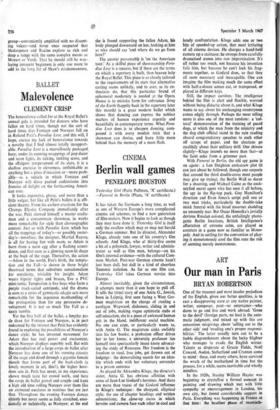CINEMA
Berlin wall games
PENELOPE HOUSTON
It has taken the Germans a long time, as well as one of Western Europe's more complicated cinema aid schemes, to find a new generation of film-makers. Now it begins to look as though they may have done it. Yesterday Girl is itself only the swallow which may or may not herald a German summer. But its director, Alexander Kluge, already runs one of his country's film schools. And Kluge, who at thirty-five seems a bit of a polymath, lawyer, writer and adminis- trator as well as film man, belongs—on his film's internal evidence—with the cultural Com- mon Market. Post-war German cinema hasn't just been dull, but dull in a kind of cheerless Teutonic isolation. As far as one film can, Yesterday Girl takes German movies into Europe.
Almost inevitably, given the circumstances, it attempts more than it can hope to pull off. It tells the (true) story of one Anita G., Jewish, born in Leipzig, first seen facing a West Ger- man magistrate on the charge of stealing a cardigan. Wayward, dishonest, sliding in and out of jobs, making vague optimistic stabs at self-education, she is a piece of awkward human grit in the bland, indifferent social machine. No one can cope, or particularly wants to, with Anita G. The magistrate sinks owlishly into his law books; a probation officer drives her to her knees; a university professor ties himself into spectacularly inane knots advocat- ing the study of Rousseau. Her freedom is the freedom to steal, lose jobs, get thrown out of lodgings: the demoralising search for an iden- tity which ends with her voluntary surrender to a prison sentence.
As played by Alexandra Kluge, the director's sister, Anita G. has obvious affinities with some of Jean-Luc Godard's heroines. And there are more than traces of the Godard influence in Kluge's technique: the chopped, elliptical style; the use of chapter headings and written admonitions; the close-up stares in which heroine and camera face each other in cool and
lonely confrontation. Kluge adds one or two bits of speeded-up action, that most irritating of all cinema devices. He charges a hand-held camera up a staircase; he swoops from carefully dramatised scenes into raw improvisation. It's all rather too much, not because his invention fails him, but because he can't lock his frag- ments together, as Godard does, so that they all seem necessary and inescapable. One can imagine the film making much the same effect with half-a-dozen scenes cut, or transposed, or played in different keys.
Still, the impact survives. The intelligence behind the film is alert and flexible, worried without being didactic about it, and what Kluge wants to say about his unchanging countrymen comes edgily through. Perhaps the most telling scene is also one of the most random : a 'cul- tural' demonstration of the training of guard dogs, at which the man from the ministry and the dog club official stand in the rain reading absurd congratulatory speeches to each other off scraps of paper, and the alsatians go stealthily about their military drill. One shivers slightly—Kluge intends no more than that—at the faint echo from a grimmer past.
With Funeral in Berlin, the old spy game is on again : a Len Deighton corkscrew plot (it can just about be followed, though one suspects that around the third double-cross most people may give up trying), the Berlin Wall as decor for a shooting, and Michael Caine as the cock- neyfied secret agent who has seen it all before, the spy in the flip-top pack. Guy Hamilton's direction and Evan Jones's script pull one or two neat tricks, particularly the double-take mock funeral with the hired mourner shedding an unseemly tear. But Oscar Homolka's jovially devious Russian colonel, the unfailingly photo- genic Berlin locations, British Intelligence's affectation of extreme calm, are played as counters in a game now as familiar as Mono- poly. And in settling for the convention of play- ing it monotonously cool the film runs the risk of seeming merely monotonous.


































 Previous page
Previous page